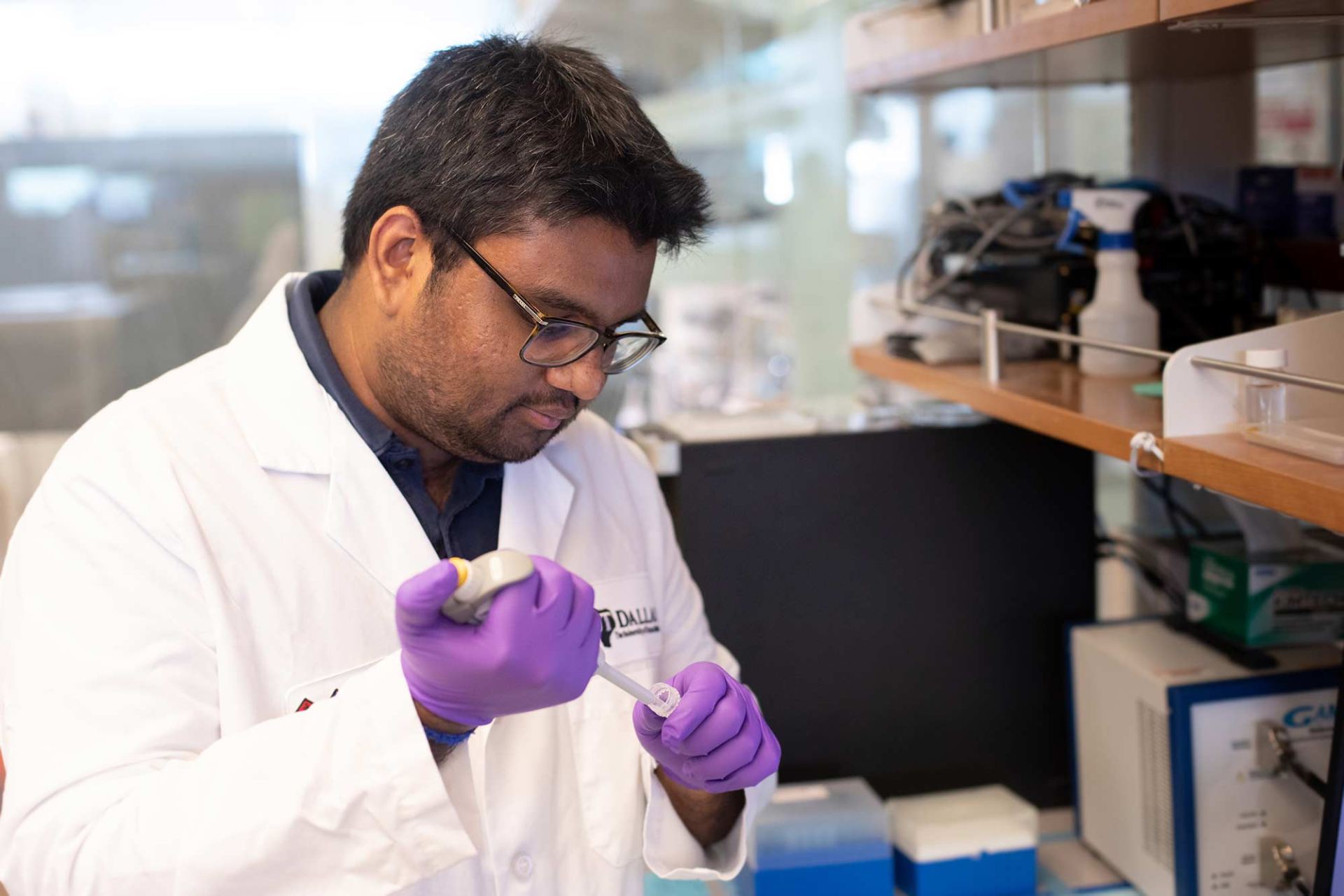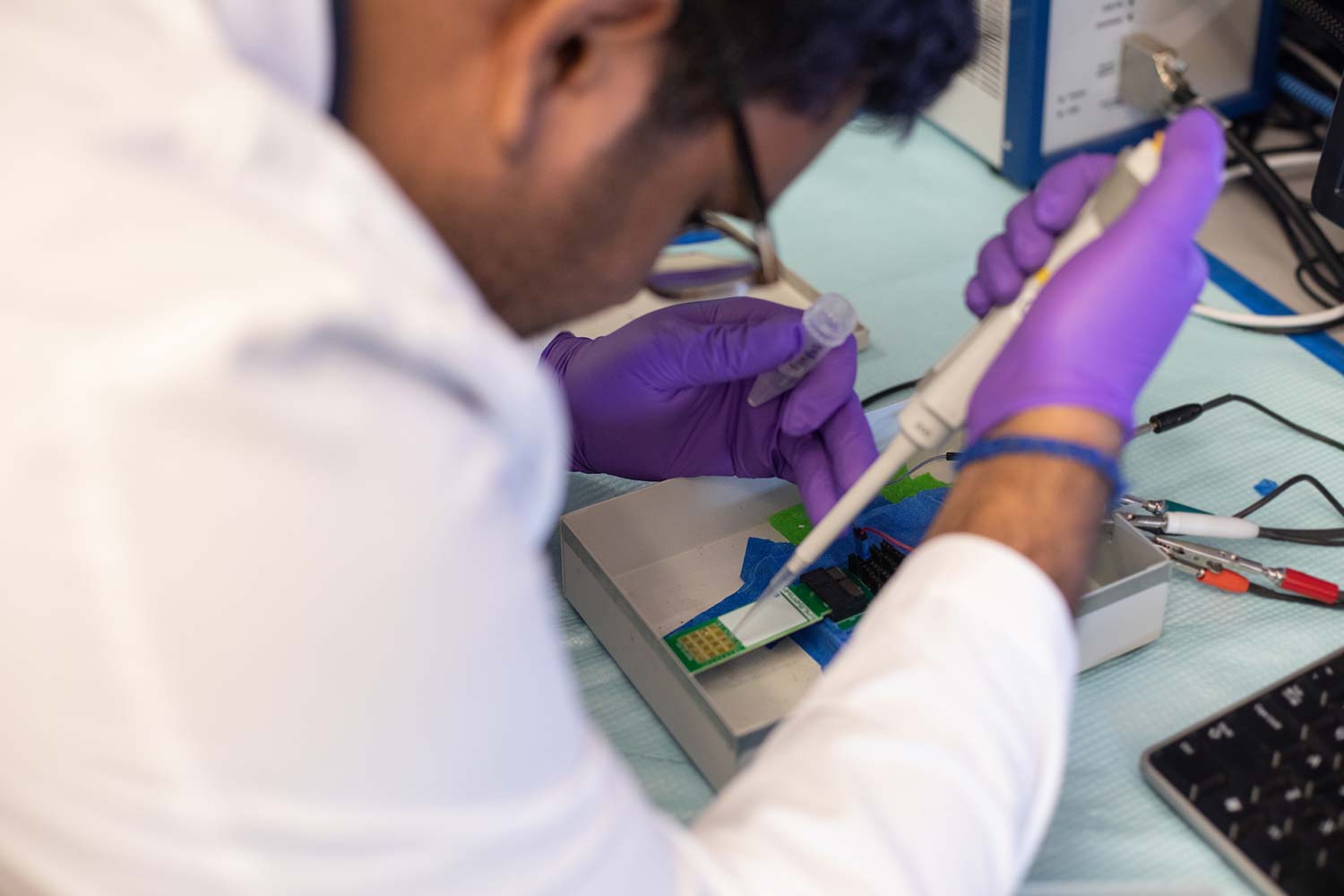Researcher Tastes Success in Winning Young Chemist Award
By: Kim Horner | May 12, 2023

Manish Samson is no ordinary undergraduate student.
Since The University of Texas at Dallas biology senior joined Dr. Shalini Prasad’s bioengineering lab as a freshman, he has co-written four research papers published in scientific journals, presented at a national undergraduate research conference, and won two Undergraduate Research Scholar Awards and a poster competition.
Now, his work with Prasad and fellow researchers on sensor technology to improve food and environmental safety has earned Samson his biggest recognition so far: the 2023 Metrohm Young Chemist Award, an honor typically given to PhD students and postdoctoral researchers.
The $10,000 annual prize is given to one student or postdoctoral researcher in North America who demonstrates novel research or an innovative approach to the applications of titration, ion chromatography, spectroscopy and/or electrochemistry.
“It was a team effort,” said Samson, who will graduate with a Bachelor of Science from the School of Natural Sciences and Mathematics this month.
Samson, Prasad and a team of researchers are working to develop portable sensor technology that can detect pesticides and genetically modified organisms (GMOs) in low-fat and high-fat foods with the same accuracy as lab methods. The research was led by Prasad, department head of bioengineering and a Cecil H. and Ida Green Professor in Systems Biology Science in the Erik Jonsson School of Engineering and Computer Science.

The researchers demonstrated the feasibility of the technology in studies published in the Jan. 30 print issue of Food Chemistry and the March 1 print issue of the journal Ecotoxicology and Environmental Safety. Prasad was corresponding author of both studies, and Samson was a contributing author of the two papers.
The researchers’ goal is to develop portable technology that could benefit consumers and farmers. Samson said the research is especially rewarding because of its potential to contribute to greater environmental sustainability.
“It’s all about reducing our footprint and forming a good symbiosis with the environment around us,” he said.
As a Plano Senior High School student, Samson got his first UT Dallas lab experience while working on a science fair project. When he became a UTD student, Samson knew he wanted to work in Prasad’s lab after reading about her research, much of which involves developing electrochemical sensor technology to monitor health and environmental conditions.
Prasad welcomes undergraduates in her Biomedical Microdevices and Nanotechnology Laboratory. She said the most successful undergraduate researchers are those who persist through the long, difficult process of gaining technical experience as they learn basics, such as properly preparing lab samples, a skill Prasad compares to learning an instrument. Many students lose interest before reaching the stage where they can do the equivalent of improvising in the lab, she said.
“A lot of it has to do with discipline, willingness to learn new things, and basically not say ‘no,’” Prasad said. “Manish persevered and that allowed him to contribute to the point where we could translate the technology from the bench to a prototype that will work in the real world.”
For Samson, that meant conducting electrochemical tests that take several hours and grinding up food samples to the right texture and consistency.
“I love applying theoretical knowledge and seeing it come to life. It’s just a fantastic feeling.”
UT Dallas biology senior Manish Samson
Prasad said Samson showed up in the lab every day and thrived.
“Once you dive into the research, you just don’t want to get out of it,” Samson said. “When you see the things you’ve been experimenting with start to work, that’s just a really rewarding experience. I also love the collaborative effort; everyone is part of the conversation.”
Samson enjoyed his research so much that after graduation he will pursue a master’s degree in biomedical engineering at UTD. After that, he has his sights set on medical school.
Samson intends to continue his research on sensor technology to detect pesticides and GMOs in food. He said he is grateful to Prasad for mentoring him and providing research opportunities that culminated in the Young Chemist Award. He presented his research in April at the National Conference on Undergraduate Research at the University of Wisconson-Eau Claire.
“I love the lab. I don’t view it as work,” Samson said. “I love research, but I really love learning more. I love applying theoretical knowledge and seeing it come to life. It’s just a fantastic feeling.”

Media Contact: Kim Horner, UT Dallas, 972-883-4463, kim.horner@utdallas.edu, or the Office of Media Relations, UT Dallas, (972) 883-2155, newscenter@utdallas.edu.





